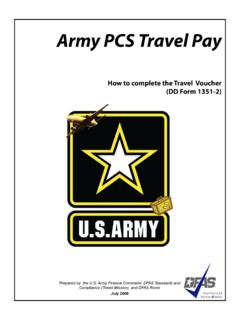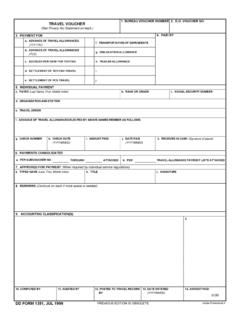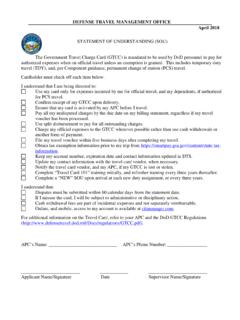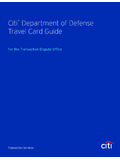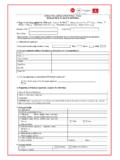Transcription of FINANCIAL MANAGEMENT POLICIES AND …
1 1 FINANCIAL MANAGEMENT POLICIES AND procedures SAMPLE 1. GENERAL PURPOSE The purpose of these POLICIES is to establish guidelines for developing FINANCIAL goals and objectives, making FINANCIAL decisions, reporting the FINANCIAL status of the Agency, and managing the Agency s funds. 2. FINANCIAL RESPONSIBILITIES It is the responsibility of the Board of Directors to formulate FINANCIAL POLICIES and review operations and activities on a periodic basis. The Board delegates this oversight responsibility to the Treasurer of the Board and the Finance Committee of which the Treasurer is the Chair. This responsibility is shared through delegation with the Agency CEO and the Head of Finance (or CFO). The Agency CEO acts as the primary fiscal agent, implementing all FINANCIAL POLICIES and procedures .
2 The Agency CEO, with oversight of The Finance Committee is responsible for the coordination of the following: Annual budget presentation, MANAGEMENT of the Endowment and other fund investments, selection of the outside auditors, and approving revenue and expenditure objectives in accordance with the Board approved long-term plans. The Head of Finance with oversight by the Finance Committee has the day-to-day operations responsibility for managing Agency funds, ensuring the accuracy of the accounting records, internal controls, FINANCIAL objectives and POLICIES , FINANCIAL statement preparation, and bank reconciliation review and approval. The Accountant is directly supervised by the Head of Finance and is responsible for the preparation of the Chart of Accounts, Reporting Formats, Accounts Payable Processing, Payroll input and Payroll processing, Cash Receipts input, Journal Entries for General Ledger, Form 1099 reporting, Form 5500 reporting, and Form 990 reporting as well as Bank Reconciliations.
3 3. CONFLICT OF INTEREST Members of the Board of Directors are prohibited from activities that might present conflicts of interest. The powers of directorship may not be used to personally benefit the Director at the corporation s expense. If a Director has a FINANCIAL interest in a corporate transaction, the Director must fully disclose the interest and abstain from voting. Loans to Directors are prohibited. 4. BUDGETING PROCESS (The entire Board must approve the budget.) The Agency s CEO, the Head of Finance, and the Treasurer shall be responsible for presenting to the Finance Committee and other Board Committees an annual operating budget draft sixty 2 (60) days prior to the end of the fiscal year and thirty (30) days prior to its submission to the Board of Directors. The Finance Committee shall review and approve the recommended fiscal year budget revenues, expenditures and cash flow, and submit it for approval to the Board of Directors.
4 The budget shall contain revenues and expenses forecasted by month. A chart describing monthly cash flow shall be included. 5. FINANCIAL STATEMENTS The Agency s FINANCIAL statements shall be prepared on an accrual basis in accordance with Generally Accepted Accounting Principles ( GAAP ). The presentation of the FINANCIAL Statements shall follow the recommendation of the FINANCIAL Accounting Standards No. 117, FINANCIAL Statements of Not-For-Profit Organizations (SFAS No. 117). Under GAAP, net assets and revenues, expenses, gains, and losses are classified based on the existence or absence of donor-imposed restrictions. Accordingly, the net assets of the agency and changes shall be classified as unrestricted, temporarily restricted and permanently restricted. Separate from Unrestricted Funds, resources for various purposes are classified for accounting and maintained for each fund.
5 Several funds are in place for this purpose including but not limited to: Endowment Fund, Restricted Funds, Cash MANAGEMENT Fund, Property and Equipment Fund, etc. The Head of Finance shall prepare and present Monthly FINANCIAL Statements in a format approved by the Agency CEO and Finance Committee. The statements shall be presented to the Agency CEO, senior MANAGEMENT , and the Finance Committee for review. 6. CASH FUND A cash fund of one-quarter to one-third of the Agency s annual operating expenses shall be maintained. When the fund balance falls below this minimum, the Finance Committee and the Board shall develop a plan and budget for rebuilding it. 7. AUDIT The Agency will have an audit of its FINANCIAL statements annually, within 4 months of the end of each the fiscal year.
6 The audit shall be completed by a firm of Independent Certified Public Accountants. The Agency CEO and the Head of Finance shall have direct responsibility in overseeing the implementation of the Annual FINANCIAL Audit. The Audit Committee shall have board oversight. In no cases shall the number of Board Members holding seats on the Audit Committee be less than the number of agency staff and MANAGEMENT . The Agency CEO and the Head of Finance shall recommend to the Audit Committee for approval, the selection of a firm to perform the annual audit. In addition, the Audit Committee 3 shall assist when necessary in the audit preparation, and report the final results to the Board of Directors. A representative of the audit firm shall be invited to attend the annual presentation to the Audit Committee, and shall be required to make a presentation to the Board if the audit report is other than unqualified, or if the auditors report material weaknesses in internal controls or reportable conditions.
7 The Head of Finance or the Auditor shall prepare the Form 990 and it shall be reviewed by the, the Agency s CEO, and the Finance Committee before submission to the IRS. 8. REVENUE AND INCOME procedures The Agency CEO in conjunction with the Vice President of Fund Development, and the Head of Finance, develops and proposes revenue goals and objectives and submits them to the Fund Development Committee prior to Board discussion and approval. All contributions shall be recorded in accordance with GAAP, with specific attention to standards FASB 116 and 117. Contributions are recorded as pledged or received in accordance with FASB 116, and must be credited to the appropriate revenue lines as presented in the annual budget and coded with the appropriate account number as designated in the Agency s Chart of Accounts.
8 9. RECORDING RECEIPTS The following procedures for cash received through the mail or given to a staff person shall be in place: Mail should be opened by a staff person that is not involved in the accounting function. All checks shall be endorsed with the Agency s official stamp. All cash and checks received through the mail shall be forwarded to the designated staff in the Fund Development Department, or other staff not involved in the accounting function. This person records all checks and cash by date, name of company or individual, designation, and amount. After recording checks, or cash, they are forwarded to the accountant who records it for accounting purposes. An individual deposit ticket shall be prepared with triplicate copies, bearing a different designation of each account.
9 That record shall include date of deposit, name of sender, amount, and designation. A copy of the bank deposit slip is retained in chronological order with copies of the deposited checks. All cash and checks shall be deposited the same business day if possible, and no later than the next business day into the Agency s Bank Account. The same procedures followed for cash receipts shall be followed when monies are received by employees as contributions for special events. Gifts received electronically, such as stock transfers or on-line contributions should be properly recorded by a staff person in the Fund Development department, and by the Accountant. Transactions should be periodically rechecked by the Head of Finance. The Accountant shall make the appropriate entries in the General Ledger books.
10 The Accountant shall reconcile all logs of incoming cash/checks with the deposit slips, and with the record of receipts maintained by the Fund Development organization. 4 10. RECEIPTS TO DONORS The Vice President of Fund Development shall ensure that all donors and contributors shall receive proper acknowledgement of their contributions in accordance with IRS Guidelines. 11. EXPENDITURES procedures All expenditures shall be approved by the Agency s CEO or a Vice President. All expenditures shall be coded by account number using the Agency s Chart of Accounts. The Accountant maintains standard accounting records containing all aspects of the Agency s FINANCIAL operations. They include but are not limited to: A general ledger, a check register, and a payroll register. Invoices shall be approved by either the Agency s CEO or a Vice President.
![[name of organization] ETHICS POLICY](/cache/preview/c/0/1/8/e/1/a/5/thumb-c018e1a53d55de1fab5750b700c3de0f.jpg)

